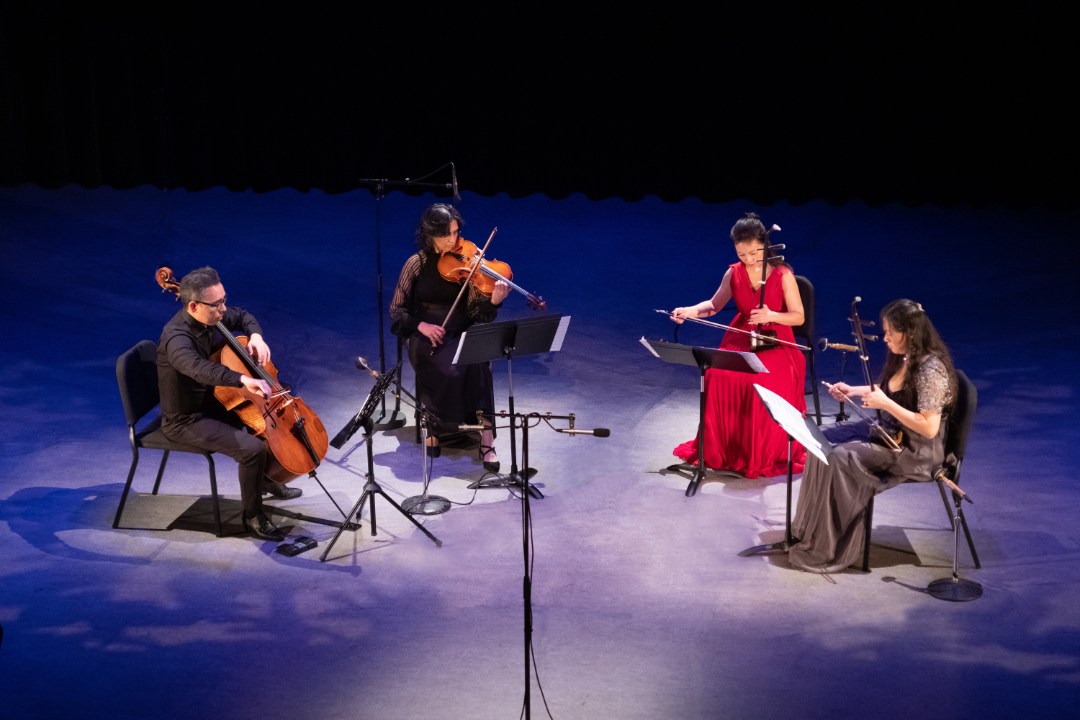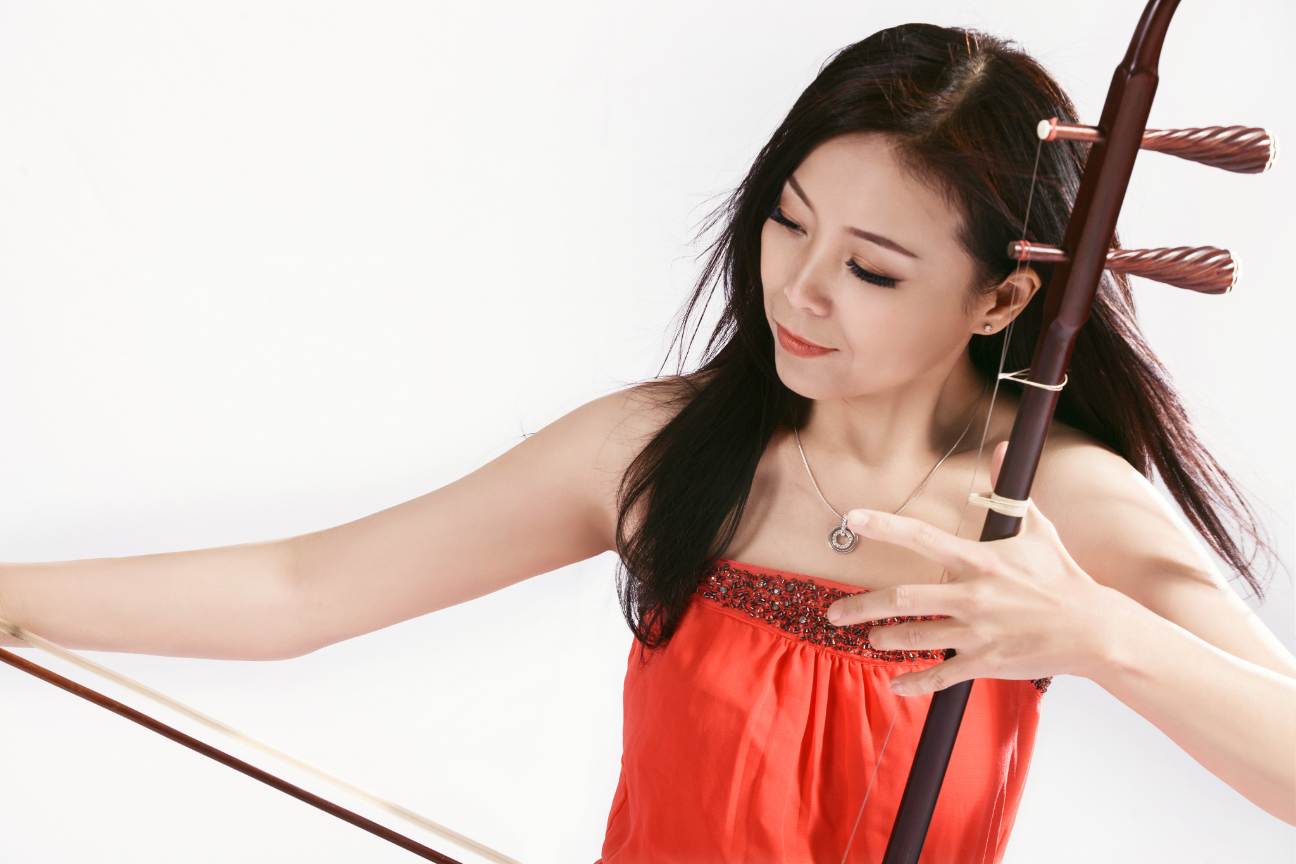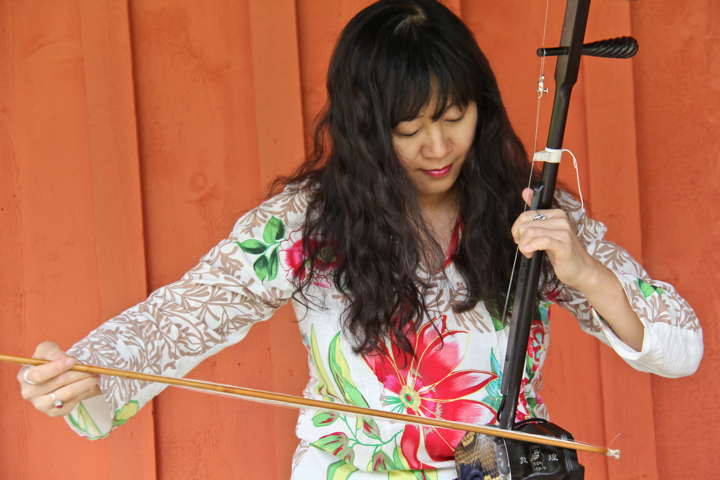Vancouver Erhu Quartet 溫哥華二胡四重奏

Erhu (Chinese violin) 二胡
Originated in Central Asia and introduced to China more than one thousand years ago, the erhu 二胡 belongs to the large family of stick fiddles that are found in many countries. Xiqin 奚琴, believed to be the precursor of the erhu, was the first bowed instrument mentioned in Chinese literature in Tang Dynasty (618-907 A.D.). Xiqin was also called huqin 胡琴. The erhu is usually made of ebony, sandalwood or rosewood, with a snakeskin resonator. The folk versions vary in the shapes and materials. The bow is made of bamboo stick and horse hair. Since 1960s, the strings are made of steel, learning from the violin and replacing the silk strings from the ancient time. A popular instrument in solo and ensemble music, erhu’s expressive sound resembles the human voice. Its traditional repertoire is deeply rooted in the vocal and opera traditions.
hu = people lived in the north and west of China;
qin = musical instrument
huqin = musical instrument of the hu people, referring to the origin of the instrument
er = two, stating that the instrument has two strings
「匯流」借鑑亞洲傳統音樂常見的齊奏,配合荷蘭現代樂手法「微卡農」(microcanon),每個樂器雖然演奏同一旋律,但時間上稍微錯開,用刻意營造出的不整齊,形成複雜的節奏。
融合東西方弓弦樂器,新成立的溫哥華二胡四重奏,以二胡與提琴的組合,將於12月10日舉行首場音樂會。團員包括來自台灣的董籃及來自北京的戎峻共同擔任二胡演奏,印度裔的帕米拉.阿特瓦拉 (Parmela Attariwala) 擔任中提琴手,以及來自韓國的林成容 (Sungyong Lim) 擔任大提琴手。他們各自專研的領域,涵蓋傳統音樂、古典音樂、現代音樂、即興演奏、世界音樂、到跨界表演藝術,在一起合作各展所長、互助互補,並為樂團帶來多元的活力。




Jun Rong 戎峻 – erhu
Jun has appeared at many concerts, festivals, recordings, and CBC radio broadcast. She is a member of Vancouver Inter-Cultural Orchestra and Silk Road Music Ensemble. She performs in a duo with harpist Lani Krantz. Jun was a guest soloist with the Victoria Symphony, Calgary Symphony, and Vancouver Symphony Orchestra, as well as the internationally renowned Vega String Quartet. Jun has released a number of CDs, including one featuring the master works of Tian-hua Liu, the most important Chinese composer for erhu music in the 20th century. Jun teaches the erhu at the Capilano University. After graduating from the China Music Academy in Beijing, Jun joined the China Opera & Dance Orchestra before making Vancouver her new home.
Lan Tung 董籃 – erhu
Artistic director of Orchid Ensemble, Sound of Dragon Society, and Proliferasian, Lan has appeared as a soloist/composer with Orchestre Metropolitain (Montreal), Vancouver Symphony Orchestra, Symphony Nova Scotia, Turning Point Ensemble, Upstream Ensemble (Halifax), Atlas Ensemble (Amsterdam & Helsinki), and Little Giant Chinese Chamber Orchestra (Taipei). As a producer/performer/composer, Lan has collaborated with musicians, dancers, and media artists from different cultures. After studying at Taiwan’s Chinese Cultural University, Lan has traveled around the world to study Hindustani music with Kala Ramnath, improvisation with Mary Oliver, graphic score with Barry Guy, Uyghur music with Abdukerim Osman, and Mongolian Horsehead fiddle with Bayar. At the Vancouver Creative Music Institute (2007-2009), she studied/improvised with Han Bennink (Holland), Barry Guy, Evan Parker, John Butcher (UK), Francois Houle, Paul Plimley…etc. Lan has won an International Independent Music Awards and multiple nominations by the JUNO Awards, Canadian Independent Music Awards, Canadian Folk Music Awards, and Western Canadian Music Awards.
Parmela Attariwala – viola
Violinist Parmela Attariwala interweaves life as a performer-creator, academic, and music educator. Parmela trained formally in violin performance at Indiana University and in Bern, Switzerland, and studied ethnomusicology at the School of Oriental and African Studies (UK) and the University of Toronto (Ph.D.). Her creative work explores the liminal space between musical genres, artistic disciplines, and identities; often using improvisation as a point of departure. She has recorded three Attar Project albums featuring works for violin and tabla. Attariwala has also collaborated extensively with choreographers (bharata-natyam, butoh and contact) as composer and movement artist. Parmela’s recent creative output includes multi-authored comprovisations, sonic memorials based on end-of-life bhakti poetry, and collaborations with performance artists Peter Morin and Ayumi Goto. She is co-composer (with Ian Cusson) of the opera-in-progress Namwayut (Calgary Opera) and has contributed to the Esker Foundation’s permanent collection in response to works by visual artists Jeffrey Gibson and Nep Sidhu. Parmela’s ongoing research and advocacy focus on equity, identity and ethics in Canadian music and education.
Sungyong Lim 林成容 – cello
Sungyong graduated with honors from the renowned Yewon School and the Seoul School of the Arts before entering the Korea National University of Arts. Later he earned a VorDiplom, a Diplom (same as Bachelor, Master Degree), a konzertexamen’s (The “Konzertexmen” is highest degree available at music university in Germany) in cello performance from the Detmold Musik Hochschule. Sungyong graduated at the top of his class, with a comprehensive performance repertoire and with considerable teaching experience. Sungyong is a member of the Borealis String Quartet, who received the honor of “Distinguished Fellow of BC” for their applauded lectures presented there as visiting scholars at Green College@ UBC. Sungyong’s passion for teaching and education is of paramount importance. In Vancouver, he has coached countless students in schools, given masterclasses, and worked with the school orchestras. On tour, he has taught and been in residence at many universities and given master classes worldwide. Sungyong plays on a 1843 Enrico Ceruti made in Cremona.
